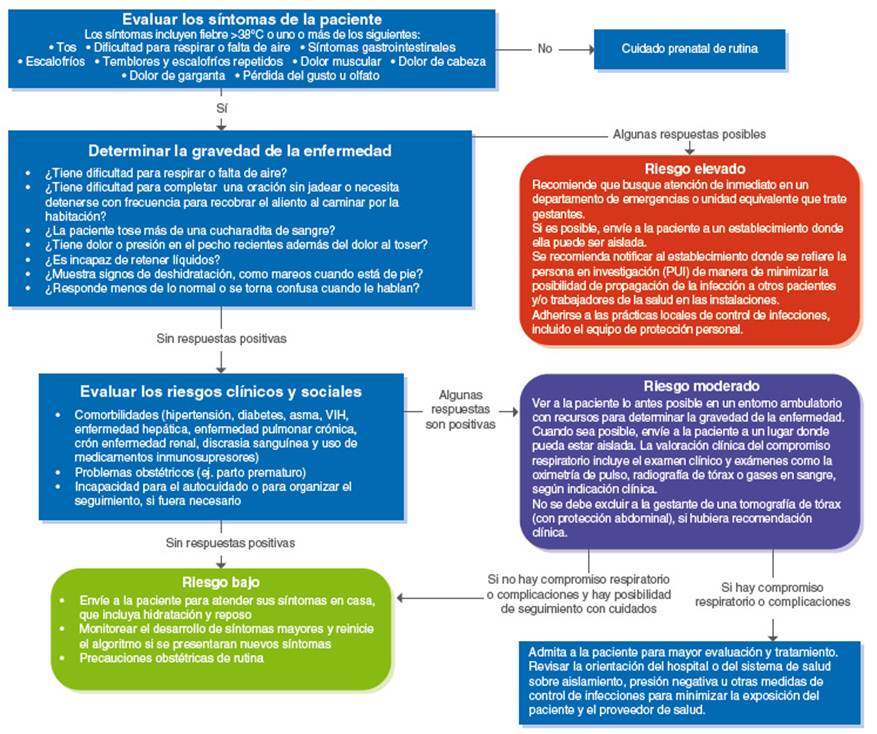A diferencia de la gripe y otras enfermedades respiratorias, y en base a un límitado número de casos confirmados de COVID-19, las mujeres embarazadas no parecen estar en mayor riesgo de enfermedad grave. Sin embargo, dada la falta de datos y de la experiencia con otros coronavirus, como el SARS-CoV y MERS-CoV, la diligencia en la evaluación y el tratamiento de las mujeres embarazadas está garantizada. Este algoritmo está diseñado para ayudar a los profesionales a evaluar y tratar rápidamente a las gestantes con exposición conocida y / o aquellas con síntomas consistentes con COVID-19 (personas bajo investigación de los síntomas [PUI]). Si los virus de la influenza aún están circulando, la influenza puede ser una causa de los síntomas respiratorios y se alienta a los a los profesionales a utilizar el algoritmo de influenza ACOG / SMFM para evaluar la necesidad de tratamiento contra la influenza o su profilaxis.
Tenga en cuenta que la COVID-19 es una situación en rápida evolución y esta guía puede quedar desactualizada. Cada nueva información sobre COVID-19 en mujeres embarazadas está disponible en los Centros para el Control y la Prevención de Enfermedades (CDC).
https://www. cdc.gov/coronavirus/2019-nCoV/index.html
Los proveedores de atención médica deben notificar de inmediato a su departamento de salud local o estatal en caso de un PUI para COVID-19 y deben contactar y consultar con su departamento de salud local y/o estatal para solicitar recomendaciones sobre realizar las pruebas de COVID-19 a las personas en investigación.
This information is designed as an educational resource to aid clinicians in providing obstetric and gynecologic care, and use of this information is voluntary. This information should not be considered as inclusive of all proper treatments or methods of care or as a statement of the standard of care. It is not intended to substitute for the independent professional judgment of the treating clinician. Variations in practice may be warranted when, in the reasonable judgment of the treating clinician, such course of action is indicated by the condi-tion of the patient, limitations of available resources, or advance2s in knowledge or technology. The American College of Obstetricians and Gynecologists reviews its publications regularly; however, its publications may not reflect the most recent evidence. Any updates to this document can be found on www.acog.org or by calling the ACOG Resource Center.
While ACOG makes every effort to present accurate and reliable information, this publication is provided "as is" without any warranty of accuracy, reliability, or otherwise, either express or implied. ACOG does not guarantee, warrant, or endorse the products or services of any firm, organization, or person. Neither ACOG nor its officers, directors, members, employees, or agents will be liable for any loss, damage, or claim with respect to any liabilities, including direct, special, indirect, or consequential damages, incurred in connection with this publication or reliance on the information presented.
Copyright 2020 American College of Obstetricians and Gynecologists











 text in
text in 



